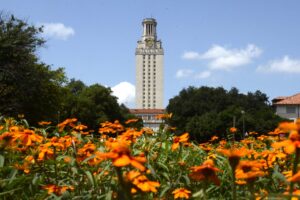AUSTIN, Texas—Dr. Mark G. Raizen, a professor of physics at The University of Texas at Austin, will receive a 2002 Max Planck Research Award for his outstanding achievements at the boundary of atomic physics and condensed matter physics.
Raizen and 11 other award winners will be honored Dec.11 in Berlin at the Harnack House of the Max Planck Society for the Advancement of Science. The Max Planck Research Award is given to leading researchers in all areas of science who have made outstanding, internationally recognized scientific achievements. Raizen is the first faculty member from The University of Texas at Austin to receive this award, which allows recipients to collaborate intensively and on a long-term basis with partners from around the world.
Raizen received his doctor’s degree in physics in 1989 from The University of Texas at Austin. He previously obtained a bachelor’s degree with honors in mathematics from Tel-Aviv University in Israel.
In Austin, Raizen was appointed an assistant professor of physics in 1991, and he rose to become a full professor and holder of the Sid W. Richardson Foundation Regents Chair in Physics. He is a member of numerous professional societies, including the American Physical Society, for which he was recently elected chair of the Division of Laser Science. He is also a fellow of the society and of the Optical Society of America, and directs and serves on many professional committees.
His research focuses on the interaction of light with matter, with an emphasis on quantum chaos, quantum transport in optical lattices and quantum reflection of atoms from surfaces. Raizen’s recent work has included the observation of dynamic tunneling using ultra-cold atoms and a discovery that low energy laser light can control the direction of growth of nerve cells.
Among other honors that Raizen has received are the prestigious I. I. Rabi Prize in Atomic, Molecular and Optical Physics from the American Physical Society in 1999 and a Sloan Foundation Fellowship. In addition, he has received young investigator awards from the National Science Foundation and the Office of Naval Research.
For more information contact: Barbra Rodriguez, 512-232-0675, media relations, College of Natural Sciences.



